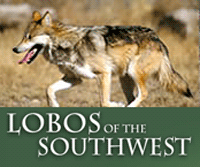AZ Daily Sun (original) Posted: Wednesday, February 9, 2011 5:06 am
In January each year, wolf supporters in Arizona and New Mexico hold their breath during the annual count of Mexican gray wolves in the Blue Range Wolf Recovery Area. The news was grim last year. Just 42 wolves had been located, a 20 percent decline from the previous year. Those 42 wolves represented the entire population of lobos living in the wild on Earth. Suspense was understandably high this year.
Federal wildlife officials recently completed their count and found 50 wolves, eight more than last year. This is the first year in the last four that documented some growth in the Mexican wolf population. Good news, but still a disturbingly low number. There is much to do if we hope to see the lobo recover.
Congressional efforts to remove Endangered Species Act (ESA) protection from wolves could have devastating results for our lobo. The Mexican wolf has been identified as "one of the rarest land mammals in the world" by the USFWS. It needs the full protection of the ESA while it struggles to reach a sustainable population. The recent decision by Arizona Game and Fish to support the removal of the wolf from ESA protection was reckless, putting recovery of the Mexican wolf at risk.
Kudos to the U.S. Fish and Wildlife Service for their decision to stop managing wolves by removing them from the wild, focusing instead on preventive ways of dealing with wolf-livestock encounters. Although wolf predation accounts for less than 1 percent of all cattle losses in Arizona and New Mexico, livestock owners have been compensated for verified wolf predation by Defenders of Wildlife. Defenders recently turned over compensation to a government interdiction program in order to focus more resources on helping cooperating ranchers to prevent wolf-livestock encounters through the use of wolf-deterring fladry (strips of cloths on fences that flap in the wind), range riders, trained dogs and other preventive methods.
The USFWS started the process for an updated, science-based wolf recovery plan involving input from livestock and hunting interests as well as wildlife conservationists. This plan is overdue and critical to the future of the lobo. Its completion and implementation should be of the highest priority.
The leading cause of Mexican wolf deaths is illegal killing by criminals who claim the right to decide the fate of the Mexican wolf for all of us rather than share land or game with this native predator. Studies in Yellowstone and elsewhere show that wolves increase the health of elk and deer herds, other wildlife and plant communities. Those who kill endangered animals are nothing more than criminals, and should be prosecuted as such.
Wolves are keystone predators. Their return to Arizona's wild lands will restore health to the ecosystem, strengthen game herds and provide ecotourism opportunities in areas where they establish residency. Senators Kyl and McCain, and the Arizona Game and Fish Department can serve all our interests best by opposing legislation to remove protections from wolves. A healthy population of wolves in Arizona is a win-win situation for us all.
Steve Robinson is a former criminal investigator. He has followed wolf recovery efforts in Arizona closely and is a volunteer with the Grand Canyon Wolf Recovery Project in Flagstaff.





